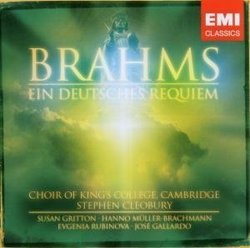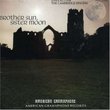| All Artists: Hanno Muller-Brachmann, Johannes Brahms, Stephen Cleobury, Evgenia Rubinova, Jose Herrera Gallardo, Susan Gritton Title: Brahms: Ein deutsches Requiem Members Wishing: 0 Total Copies: 0 Label: EMI Classics Original Release Date: 1/1/2006 Re-Release Date: 10/31/2006 Genre: Classical Styles: Opera & Classical Vocal, Historical Periods, Early Music Number of Discs: 1 SwapaCD Credits: 1 UPC: 094636694825 |
Search - Hanno Muller-Brachmann, Johannes Brahms, Stephen Cleobury :: Brahms: Ein deutsches Requiem
 | Hanno Muller-Brachmann, Johannes Brahms, Stephen Cleobury Brahms: Ein deutsches Requiem Genre: Classical
|
Larger Image |
CD DetailsSimilarly Requested CDs
|
CD ReviewsNovelty value only I. Martinez-Ybor | Miami, FL USA | 03/20/2008 (3 out of 5 stars) "If you are to have one recording of the Brahms Requiem, this should not be it. It matters little that the reduction for two pianos was done by Brahms, this is not an alternative to Brahms orchestral original, never more painfully so than in Den Alles Fleisch movement (#2). Klemperer(EMI) and Karajan(DG) probably have not been bettered in this music. Nonetheless, it is interesting to hear the piano-backed version, with the added novelty here that it is performed by King's College choristers, trebles and men's voices, in music that was composed with standard mature male and female choral sounds in mind. Such is the second variant thrown into this recording. Unfortunately, after one gets over the novelty of the sound, for these ears it really doesn't work. And part of the problem is the very English flutey sound the excellent choristers make, which works perfectly well in many other pieces such as their wonderful recording of Fauré's Requiem or their many recordings of anthems and carols. Somehow here it all sounds not ethereal but emasculated, certainly underpowered, and far removed from the central earthiness of Brahm's music. This piece is far closer to Walt Whitman than to Palestrina. Had it been a continental choir, say the Weiner Sängerknaben, or the Tolzer, or the Escolanía Montserrat, or even in England, the Westminster Cathedral (not Abbey) Choir, with their more forward, substantial sound, perhaps it might have been more plausible. The soloists are fine, particularly Hanno Mueller-Brachmann. Cleobury's pace is fine for the forces at hand. This CD is worth sampling once for the novelty of the approach. I have high regard for the King's College Choir and Mr. Cleobury and I am sure that some of their dedicated fans may have been eagerly waiting for this. For me, it is just that they came together in the wrong piece of music. One has to ask, are recording companies that hard-pressed for repertoire?" New perspective and intimacy in Brahms's choral masterpiece Allan Brain | Houston, TX USA | 02/20/2007 (4 out of 5 stars) "Brahms "German Requiem" has had something of a bad press and bad luck since its initial success. The bad press stems from George Bernard Shaw's clever criticism of especially this work. The bad luck has to do with recordings and performances. This was not a work that was likely to be played or recorded during the late '30s and early '40s in the USA or the UK for obvious reasons. Nor was it the kind of work that the Third Reich would embrace (though that horrific regime sponsored performances of Beethoven's Ninth Symphony often enough without seeming to notice a problem). It is a great work. The second movement was originally part of a design for a symphony and the very first time I heard it, I wished that Brahms had gone ahead and developed the march-like theme into a symphony. Perhaps he did--Brahms is known to have discarded a lot of music. This is the composer's arrangement for two pianos accompaniment. Performances of the work in locales where an orchestra might not be available would use arrangements like these (and music schools still do). If you want the conventional orchestral version--and you should--I suggest that you look into the recording by Otto Klemperer on EMI. But this is a nice supplement. The two-piano accompaniment does not enhance the experience over the orchestral version in all sections of the piece, but it does add some intimacy in some of them. I think this is also the first recorded version to use a traditional English cathedral choir--boys and men. So that is another reason to try it out. The choir is a little shrill from time to time. The soloists are very good. I like the orchestral version better, but this offers a new perspective and in some parts a really intimate Lieder-like feeling." Brahms Requiem...for boys and piano duo pyramidcvv | Western US | 11/16/2007 (5 out of 5 stars) "
Prepare yourself for a unique aural experience. This is the premiere recording of Brahms' piano reduction (recorded in Apr 2006). And as far as I know, it is probably the first recording to use a boys/men choir. Fans of the renowned Stephen Cleobury and the Choir of King's College will find this venture into Brahmsian Romanticism very revealing. While the pianists Evgenia Rubinova and Jose Gallardo make a fine duo, the listener will need to leave behind memories of mighty tympani beats and powerful brass in preparation for this fascinating example of reduction. The wonderful work of the boys, however, more than makes up for the missing orchestral fireworks. There are certain passages that lend themselves well to the youthful sounds of a boys chorus. In Movement 2, "So seid nun geduldig" is given a wonderful lilt. Movement 4 is a perfect vehicle for the King's College choristers. Other passages seem to have been massaged a bit to fit the pre-Romantic styles that this choir is more accustomed to...and to good effect. In Movement 2 again, listen for the almost Monteverdian-like shimmer of "Aber des Herrn wort". Soloist Susan Gritton emotes more than many other sopranos who have recorded this work. But I found Hanno Muller-Brachmann a bit too lightweight for my taste. At 65'14", this is a very brisk reading. But Cleobury and company make it sound quite natural. The diction is very clear, and all the notes are audible. With the myriad of available recordings of the Brahms Requiem to choose from, this version is admittedly only for the scholarly, the curious, and of course the fervent fans of King's College. Nevertheless, it is an album worth checking out. Texts and translations included." |

 Track Listings (7) - Disc #1
Track Listings (7) - Disc #1







![Across The Universe [Deluxe Edition]](https://nationalbookswap.com/cd//m/51/1251/1241251.jpg)
